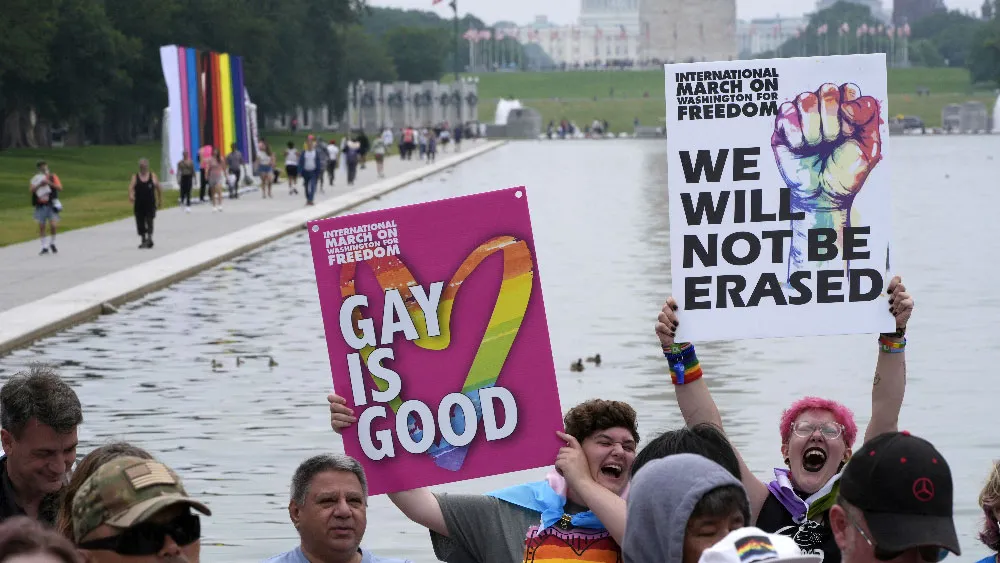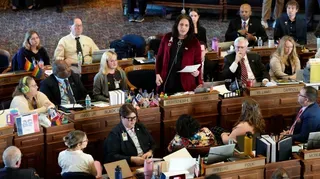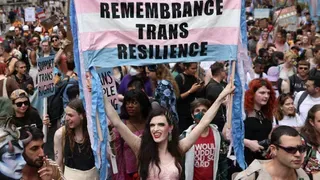April 16, 2010
Homophobia Inhibits Fight Against AIDS Spread in Africa
Kilian Melloy READ TIME: 3 MIN.
Homophobia in Africa stymies efforts to stem the rising tide of HIV infection--and the situation is only getting worse.
An April 12 article at the website for amfAR, the Foundation for AIDS Research's The MSM Initiative, reported on the escalating anti-gay fervor in some African nations. The site's name, MSM, refers to "Men who have sex with men," an acknowledgement that many males who may be at risk of infection via sexual contact with others of the same gender identify themselves as heterosexual and are married. In American jargon, men who identify as heterosexual but who seek other men for sex are said to be on the "down low." But men on the down low often neglect to get tested for HIV, partly due to a stigma around HIV. The unfortunate result is that untested, HIV+ individuals can unknowingly expose others to the virus. Moreover, not getting tested means that HIV+ individuals do not get treated--and early treatment is key in preserving the health and the lives of people living with HIV.
But efforts to educate and reach out to the public about fact-based matters of sexual health can get activists in trouble. The MSM article reported on several instances of anti-gay mob violence and official persecution faced by those seeking to inform and educate the public, including clinic workers in Kenya who were attacked, beaten, and doused with kerosene; efforts to set the men alight were not successful.
In Malawi, the article noted, an activist was arrested for possession of health material related to sexuality and HIV because authorities viewed it as "pornographic." Other arrests reportedly targeted supporters of two Malawi gay men who were imprisoned after hosting a party to celebrate their engagement to be married; the wedding would have not have been legal, since in Malawi marriage equality is against the law, but the celebration alone resulted in "indecency" charges under laws that are used to persecute gays.
The article also cited a bill being considered in Uganda that would punish gays with the death penalty for repeated sexual encounters with other men--or a single encounter, if the suspect is HIV+. The article noted that the anti-gay law was proposed following a visit to the Uganda by anti-gay American evangelicals who lectured about the "gay agenda."
"Homophobia, of course, is present in every country," the MSM Initiative article reads. "But a wave of homophobic rhetoric and violence in some African countries is undermining efforts to combat high rates of HIV/AIDS among MSM. Human rights activists, AIDS advocates, and grassroots MSM organizations-including a number of groups funded by amfAR's MSM Initiative-say that the progress that had been made over the past several years in reaching African MSM is being threatened by a new climate of fear and repression that is sweeping parts of the continent."
Canada news agency Canwest reported in a Jan. 4 article on the situation faced by gays in Senegal, a predominantly Muslim nation where gays face social rejection and legal peril. As in other places, groups dedicated to fighting HIV by educating the public are seen as "promoting" homosexuality, the article said.
The article also noted that of the estimated 33 million people worldwide who are living with HIV, two-thirds are in sub-Saharan Africa. "These people, because they're harassed, will hide," said the executive director of the U.S. Global Fund to Fight AIDS, Tuberculosis and Malaria, Michel Kazatchkine. "Because they hide they will not access treatment services, and they will go underground and spread the epidemic. So stigma and discrimination are major issues."
A similar warning came from UNAIDS head Michel Sidib�, who noted that in 85 nations consensual sexual relations between adults of the same gender are against the law, and that the legal and social climate in those places helps to drive the soaring rate of HIV infections, which afflict gays and straights alike. "We must insist that the rights of the minorities are upheld," a Mar. 16 Associated Press article quoted Sidib� as saying. "If we don't do that... I think the epidemic will grow again. We cannot accept the tyranny of the majority."
But, said the MSM Initiative website, there has been one positive outcome in the rising tide of anti-gay violence sweeping some African nations: even in the most homophobic countries, the issues are now being openly discussed, something that did not happen before. "More people know about our initiative," said Kenyan activist Peter Njane, director of Ishtar MSM, which receives funding from amfAR. "After we were mentioned in the media, our website kept jamming," Njane said. "People who need information are coming to us."
Kilian Melloy serves as EDGE Media Network's Associate Arts Editor and Staff Contributor. His professional memberships include the National Lesbian & Gay Journalists Association, the Boston Online Film Critics Association, The Gay and Lesbian Entertainment Critics Association, and the Boston Theater Critics Association's Elliot Norton Awards Committee.







